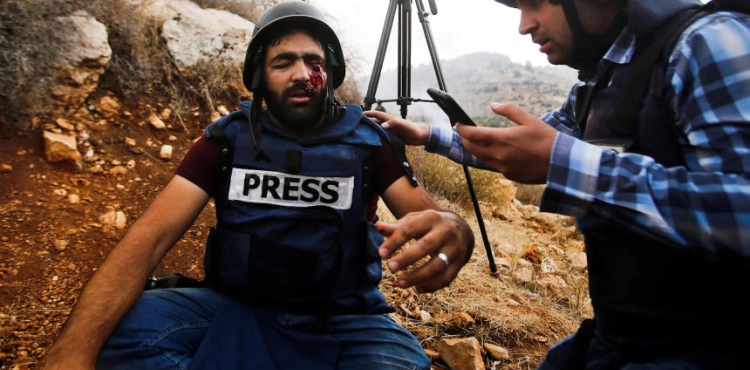An annual report of the Committee to Support Journalists documented that there were 598 cases of grave violations by the Israeli occupation of journalists.
In its report, the committee confirmed that there has been a noticeable escalation of attacks by the occupation on press freedoms in the occupied Palestinian territories, where they intensified in May 2019, as a result of the intensification of the work of journalists in their coverage of violations against citizens who continued their protests on the anniversary of Earth Day activities.
The report indicated that the occupation intentionally targeted journalists with live and metal rubber coated bullets, gas bombs, beating, threatening and insulting, and using them as human shields during field events, continuing to arrest them, storming their homes and offices, confiscating their equipment, preventing them from covering, traveling, and imposing financial and other fines.
The Committee to Support Journalists held the occupation fully responsible for the crime of sniping journalists, including during the year 2019 targeting Sami Masran from the Gaza Strip, and Moaz Amarneh from the occupied West Bank, after losing their sight after being directly targeted with rubber and metal bullets in addition to the retina’s damage to the journalist Attia Darwish.
The Committee stressed that the violations of the occupation are crimes under international humanitarian law and international human rights law, and they reflect the extent of the success of the Palestinian media in conveying the truth, and exposing the falsehood of the Israeli version of the crimes against the Palestinian people in the occupied territories.
The Committee called upon the United Nations and the countries of the world to exercise its moral and legal role in deterring the occupation to stop its aggression against journalists and media institutions, and to provide them with the necessary protection to fulfill their professional role.
The report of the committee monitored (163) cases of attacks and shootings against journalists, including women journalists, whether the targets were direct live bullets or rubber coated, or beating, kicking, causing harm, fractures, bruises throughout their body, humiliation, treatment with dignity, and suffocation due to inhalation of poisonous gas and pepper gas, and exposure Their equipment for destruction and smashing.
There were also (79) cases in which journalists were arrested, summoned, detained for hours and days, deported, and used as human shields during their suppression of the confrontations taking place in the Palestinian territories.
While documenting (26) cases of violations, they varied between extending the detention of more than once before the date of their release, fixing judgments against journalists, issuing rulings against others, and postponing the trial of some of them still in the occupation prisons.
The report monitored (62) cases in which journalists were prevented from doing their work and covering events. 5 cases of incitement, accusation and prosecution of journalists and media institutions were monitored, while more than (174) cases of closures and threats of closure and interference on media institutions were monitored in the context of fighting the Palestinian content.
The report also recorded 29 cases of storming, raiding, searching and destroying, in which press equipment, equipment and press materials were seized for the homes of journalists and their media organizations, and 9 cases of travel bans were recorded.
In the context of fighting Palestinian content by the management of social networking sites, the report of the Committee to Support Journalists recorded during the year 2019 dozens of cases, including the closing of the accounts of dozens of news and media sites and the accounts of media professionals working in those sites, which ranged between deleting pages and accounts, blocking, publishing, deleting posts, and preventing comment Restrict page access, prevent live broadcasts, and delete old posts.
The Facebook company, "WhatsApp", also banned hundreds of accounts of Palestinian journalists, who follow the events, and published news of the past Israeli aggression on the Gaza Strip, as they received messages from the WhatsApp administration stating that they were prohibited from publishing or benefiting from application services.












